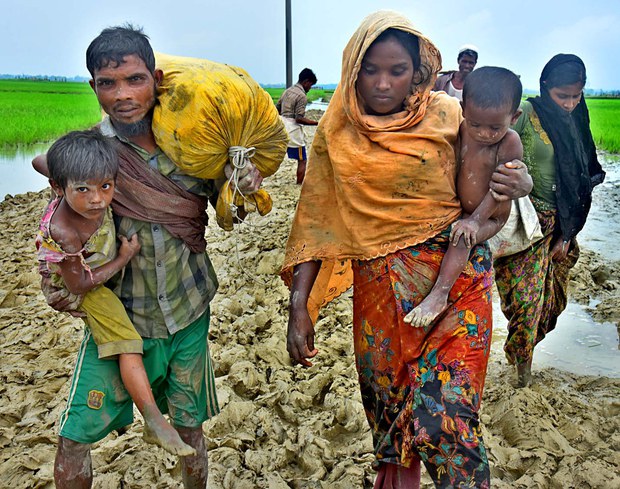US Announces $32 Million in Aid for Rohingya Muslims
2017.09.20
Washington
 A Rohingya family enters Bangladesh after crossing the border near Teknaf, Cox’s Bazar, Sept. 6, 2017.
A Rohingya family enters Bangladesh after crossing the border near Teknaf, Cox’s Bazar, Sept. 6, 2017.
Updated at 4:24 p.m. ET on 2017-09-20
The United States announced Wednesday that it was providing close to $32 million in new humanitarian assistance to help Rohingya Muslims fleeing violence in Myanmar’s Rakhine State.
Washington also praised Bangladesh for its response to a humanitarian crisis after close to half a million refugees from neighboring Myanmar fled into across the border in less than a month.
“The new funding brings U.S. humanitarian assistance to internally displaced persons in Burma and refugees from Burma in the region to nearly $95 million in FY 2017, and it reflects the U.S. commitment to help address the unprecedented magnitude of suffering and urgent humanitarian needs of the Rohingya people,” a U.S. State Department statement said, referring to Myanmar by its other name.
The funding is to help displaced Rohingya in Rakhine state, Rohingya refugees in Bangladesh, and host communities in Bangladesh, the statement said.
The assistance was announced as U.S. Vice President Mike Pence delivered stinging condemnation of the violence against Rohingya Muslims in Myanmar before the U.N. Security Council in New York.
“Recently, Burmese security forces responded to militant attacks on government outposts with terrible savagery -- burning villages, driving the Rohingya from their homes. The images of the violence and its victims have shocked the American people and decent people all over the world,” he said, according to a transcript of the remarks.
The violence had prompted “a historic exodus” of Rohingya into Bangladesh, he noted.
“The United States renews our call on Burma’s security forces to end their violence immediately and support diplomatic efforts for a long-term solution,” Pence said.
“President Trump and I also call on this Security Council and the United Nations to take strong and swift action to bring this crisis to an end and give hope and help to the Rohingya people in their hour of need.”
More than 420,000 refugees have crossed the border into Bangladesh since Aug. 25, when Rohingya insurgents attacked police outposts in Rakhine state, triggering scorched-earth security operations against Rohingya villages that U.N. officials have described as “ethnic cleansing.”
Although many have lived in Myanmar for generations, Rohingya Muslims are considered illegal immigrants in their home country and denied citizenship in Myanmar, where they are a despised and persecuted minority, according to human rights activists.
Praise for Bangladesh
Prior to the latest influx of refugees, Bangladesh was already a reluctant host in its southeastern district of Cox’s Bazar to some 400,000 Rohingya refugees who fled earlier violence in Myanmar. They live in two UNHCR-registered refugee camps and a host of unofficial settlements, sites that have been stretched to the limit by the new arrivals.
The U.N. refugee agency said this month it “urgently required” U.S. $30 million in new funds to respond to the “ongoing emergency” in Bangladesh. UNICEF said it would need at least U.S. $7.3 million for the next three months.
Some 60 percent of the arriving refugees are children, in dire need of vaccinations, clean water and food to prevent outbreaks of disease, UNICEF said.
Initially attempting to turn the refugees back, Bangladesh all but opened its border as new arrivals crossed daily at different points. Dhaka has since announced that it was allocating new land for Rohingya settlements and attempting to feed the Rohingya population until they were repatriated.
“We applaud the government of Bangladesh’s generosity in responding to this severe humanitarian crisis and appreciate their continued efforts to ensure assistance reaches people in need,” the State Department said.
The new U.S. aid would support international organizations including the United Nations and non-governmental organizations operating in the region, it said.
“The rapid influx of hundreds of thousands of refugees has strained resources and overwhelmed humanitarian agencies and local authorities. Through this support, the United States will help provide emergency shelter, food security, nutritional assistance, health assistance, psychosocial support, water, sanitation and hygiene, livelihoods, social inclusion, non-food items, disaster and crisis risk reduction, restoring family links, and protection to over400,000 displaced persons in Burma and in Bangladesh,” it said.







